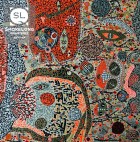“Mother” is about a woman giving birth to a squid, an uncommon situation, for sure! But the story itself, at its heart, it isn’t so much strange as familiar—the way the newborn feels a bit alien, the giving of self, the change in support relationships. What made you decide to write about motherhood in this way?
I’ve been writing about motherhood in one form or another since my second daughter was born a year ago. This particular story touches on themes (most of which you listed!) regarding the difficulties of motherhood that I hadn’t been able to tap into in other ways. I wanted to take this idea of losing one’s self—a feeling I think all parents (especially mothers) experience at some point if only temporarily—to the extreme and play with surreal elements I didn’t feel as free to explore in other genres. I really wanted to let my weird imagination go unchecked. Motherhood/parenthood can feel otherworldly sometimes, and it felt natural to let this story bleed into that space.
Second person is quite effective in your story, and I know it’s sometimes difficult to carry off. What made you decide to use second? What effects were you hoping to achieve with it?
Thank you! I carried this story around with me for about a month before I tried to write it down, and it was always in second person. Even though I’ve always been a bit intimidated by second person, I think it was just instinct for this particular piece. It seemed necessary to bring the reader in as close as possible in order for this idea to work. I wanted a reader to feel consumed by the squid in ways I didn’t think I could achieve in a first or third-person point of view. I trusted that the reader could suspend disbelief and be open to imagining how it might feel to find themselves bringing a surprising creature into the world and losing themselves in the process.
Georgia O’Keefe says of choosing the right details in painting—which to me, also works for writing fiction—“It is only by selection, by elimination, by emphasis, that we get at the real meaning of things.” The detail in this story is beautiful, particularly the descriptions of the baby squid. Can you talk about your research or preparation? And how important, in such a magical story, is it to get these details right?
Oh gosh, I love this quote so much. I’m a science and research junky, so I did spend some time reading and watching videos about squid. I watched how they swim, how and what they eat, and read a lot about how the firefly squid uses bioluminescence. Most of these details didn’t make it into the story, but that’s kind of the fun of research, right? We get to stockpile our mental vaults with all of these rich details and facts that will be at our disposal later. Ultimately, there wasn’t a squid species that fit everything I needed for “Mother,” so I made up a name and pulled aspects of various species into one. It was important, even in a story that isn’t based in reality, that these details be believable and familiar, but part of the fun of fiction is the freedom to create. I gave myself permission to create.
You are a multi-faceted writer—essays, poetry, fiction! “Mother” has moments that feel like poetry. How did “Mother” become short fiction (and not poetry)? Is writing fiction a different process for you than writing poetry?
I think the most honest answer is that “Mother” came to me in the form of a flash fiction piece. I never really thought about it taking other forms or exploring the idea in different genres. I love writing essays and poems—they are the majority of what I write—but this developed as a story from the very beginning and I couldn’t get it out of my mind. I am currently working on a poetry and a nonfiction manuscript, so I tried to avoid this story simply because of time (with two kids under three at home, writing time is hard to come by), but this mother and her squid kept demanding my attention.
My process with fiction is different only in that plot is more significant. But as you pointed out, I approach fiction in much the same way that I do poetry and essays. Really everything I write is some form of hybrid. I tend to bring the language and images I use in poetry into everything else I write. I try to look at sentences the way I look at lines in a poem. I don’t know if this is particularly effective, but it’s become the only way I know how to approach my writing.
The ending is haunting. Why, in the last two sentences, does the focus shift completely to the squid’s graceful motion?
I really struggled with how to end this piece. The whole story is centered on this woman who is giving everything for this creature she birthed into the world. She’s sacrificed her marriage, her home, her physical necessities all for the happiness of this child she loves so much. In the end, the story is really about being consumed and losing one’s self. She has allowed the idea of “mother” to supersede everything else in her life and in the end even her death by drowning is inevitable. After thinking about that, it felt very organic to end with the shift to the squid. The squid’s graceful movements. Its comfort in the habitat she created for it. It’s what she’s lost herself to. I wanted the reader to see what she would’ve focused on in those last moments. Her child thriving in a world she made to sustain it.



 The core workshop of SmokeLong Fitness is all in writing, so you can take part from anywhere at anytime. We are excited about creating a supportive, consistent and structured environment for flash writers to work on their craft in a community. We are thrilled and proud to say that our workshop participants have won, placed, or been listed in every major flash competition. Community works.
The core workshop of SmokeLong Fitness is all in writing, so you can take part from anywhere at anytime. We are excited about creating a supportive, consistent and structured environment for flash writers to work on their craft in a community. We are thrilled and proud to say that our workshop participants have won, placed, or been listed in every major flash competition. Community works.